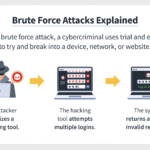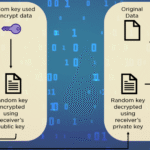In today’s digital age, the significance of cryptography cannot be overstated. It serves as the backbone for securing sensitive information, from personal data to governmental communications. The rapid evolution of technology and the escalating demand for cybersecurity professionals have rendered a Master of Technology (MTech) in Cryptography an attractive academic pursuit. Yet, a pressing question emerges: can one secure a high-paying job after obtaining this degree? This article delves into various facets of this inquiry, offering insights on prospective career paths, salary expectations, and the skills necessary to thrive in this competitive field.
First and foremost, understanding the career trajectory post-MTech in Cryptography is vital. The field is replete with lucrative opportunities across diverse sectors. Professionals equipped with this degree can pursue roles such as Cryptographic Engineer, Security Analyst, Information Security Manager, and Penetration Tester, amongst others. Each role demands a unique set of skills but is unified by the foundational knowledge of cryptographic techniques and protocols.
A Cryptographic Engineer, for instance, focuses on designing and implementing encryption algorithms. This role is essential as organizations strive to safeguard their data against breaches. A comprehensive understanding of mathematical frameworks and software engineering principles is paramount for success in this position.
In contrast, Security Analysts are tasked with monitoring and defending against cyber threats. This role typically involves real-time analysis of attacks and the development of strategies to mitigate risks. Familiarity with network security and incident response techniques is crucial. Such analysts often work in tandem with IT departments to create resilient systems capable of thwarting potential intrusions.
The salary expectations for these roles can be striking, making the pursuit of an MTech in Cryptography a financially sound decision. Entry-level positions may yield salaries ranging from $70,000 to $90,000 annually, while seasoned professionals can command salaries exceeding $150,000. Other factors influencing salary include geographic location, industry, and the size of the employer. For instance, cryptography jobs in financial institutions or defense contractors tend to offer premium compensation packages compared to smaller companies or government positions.
While monetary compensation is a significant incentive, career satisfaction and growth potential should not be overlooked. The cryptography sector is marked by continuous learning and adaptation, given the rapid advancement of technology and cyber threats. Professionals must stay abreast of the latest developments, techniques, and regulations in the field. This ongoing education can be both intellectually fulfilling and essential for career advancement.
One of the predominant trends in the industry is the increasing reliance on blockchain technology and cryptocurrencies. These innovations have revolutionized the way data is perceived and secured. As organizations delve into decentralized systems, the demand for expertise in cryptographic methodologies applicable to blockchain is surging. As such, MTech graduates can pivot towards specialized roles focusing on blockchain security, which often feature enticing salary prospects and dynamic work environments.
The landscape of job availability is further enhanced by the expansive professional networks established during academic pursuits. Universities with strong cryptography programs often foster connections with industry leaders, creating pathways to internships and job placements. These relationships provide MTech graduates with a competitive edge in the job market. Furthermore, participation in internships offers practical experience that can be invaluable during job interviews.
Moreover, soft skills play an integral role in securing high-paying positions. Communication, teamwork, and problem-solving abilities are paramount when navigating the cryptography landscape. Professionals frequently collaborate across departments to devise comprehensive security strategies, making interpersonal skills essential. Furthermore, practitioners must articulate complex technical concepts to various stakeholders, emphasizing the necessity of strong verbal and written communication skills.
The onslaught of cybersecurity threats underscores the importance of cryptography, cementing its role in today’s job market. With the increasing prevalence of cybercrimes, including identity theft and data breaches, organizations are ramping up their investment in security measures. Consequently, the demand for skilled professionals in cryptography is expected to grow exponentially. The U.S. Bureau of Labor Statistics (BLS) projects that employment for cybersecurity analysts will grow by 31% from 2019 to 2029, a remarkable rate compared to the average for all occupations.
However, the path to industry success may not be devoid of challenges. The field is highly competitive, and those entering must be prepared to continually hone their skills. Gaining additional certifications, such as Certified Information Systems Security Professional (CISSP) or Certified Information Security Manager (CISM), can enhance one’s qualifications and appeal to prospective employers.
In conclusion, an MTech in Cryptography presents a plethora of opportunities for high-paying employment in a rapidly evolving digital landscape. While the financial rewards are significant, the journey requires a commitment to continuous learning and adaptability. Professionals who embrace the inherent challenges and actively refine their skills will find themselves well-positioned to forge a successful and rewarding career in this critical field. The intersection of cryptography, cybersecurity, and technological advancement will remain a focal point for professionals seeking to contribute to a secure future.






Leave a Comment